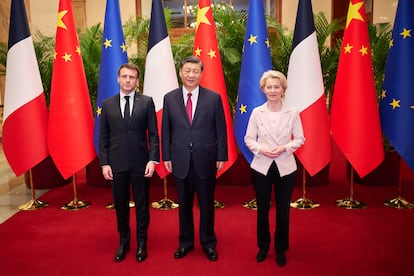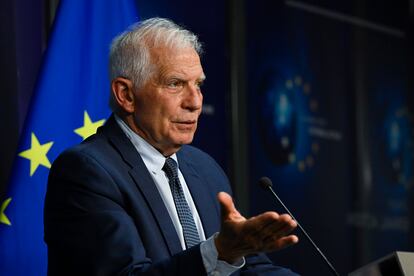Brussels toughens its stance on China over trade and Ukraine war
A EU External Action Service document urges rebalancing of bloc’s relationship with Beijing to limit over-dependence and dissuade support for Moscow


The European Union is seeking to rebalance its relationship with China. The bloc currently defines the Asian giant as a partner, competitor, and systemic rival, in that order. However, Brussels believes that the concept of China as a rival has gained greater significance. “The balance of these approaches is conditional on China’s response to our engagement and the evolution of its behavior,” says a document prepared by the European External Action Service (EEAS), sent to EU member states and to which EL PAIS has had access. The text, accompanied by a letter from the High Representative for Foreign Affairs and Security Policy Josep Borrell and which will serve as a basis for discussion among EU foreign ministers at a meeting Friday in Stockholm, indicates that the union will respond to any challenge from China with a tougher stance on relations.
How to interact with China is a controversial and divisive issue in the EU, where there is no unified position. There are pragmatic countries — especially in terms of a more commercial approach — such as France and others, including Lithuania and Sweden, who warn that relations with a state they define as repressive at home and aggressive overseas should be curtailed as much as possible. German Chancellor Olaf Scholz has also emphasized in recent days that the idea of Beijing as a “rival” should be strengthened.
Borrell appears also to be leaning more toward pragmatism. While the diplomat stresses that coordination with Washington — which is in the middle of a trade war with Beijing — will remain essential, the EU must avoid becoming embroiled in a competition between the United States and China from which can emerge “only one winner.” Although the tone of Borrell’s letter and the working document mark a hardening approach to Beijing, it is also very measured. Much more so than European Commission President Ursula von der Leyen, who has accused China of wanting to change the world order to impose its dominance. Some of the more hardline member states have already taken Borrell’s approach to task as they consider him too soft on Beijing.
Brussels has also warned that relations with China will not prosper if Beijing does not exert its influence to pressure Russia into a withdrawal from Ukraine. The EU considers that Beijing’s stance on the invasion launched by the Kremlin is “pro-Russian,” but also notes that China will be the geopolitical beneficiary if Moscow is defeated. The “no-limits” friendship between all-powerful Chinese leader Xi Jinping and Vladimir Putin is in fact limited, Borrell said Thursday at the European Security and Defense Conference in Brussels, and the relationship is becoming increasingly unbalanced in favor of Beijing. “The EU must maintain clear messages about the serious negative impact on EU-China relations in the case that China circumvents sanctions and provides support to the Russian war effort,” EEAS says. Borrell has also pointed out that any supposed neutrality in the conflict is tantamount to siding with the aggressor.

The EU foreign ministers’ meeting in Stockholm comes amid criticism and threats from Beijing over the European Commission’s proposal to sanction seven Chinese companies for helping Russia to evade sanctions. Brussels’ proposals for its 11th package of sanctions on Moscow has also raised tension with Beijing by a notch. Borrell has also told member states to be prepared for a “potentially critical escalation” over China’s claims on Taiwan while noting that any unilateral change in the status quo and the use of force could have enormous economic, political and security consequences globally, especially given Taipei’s role as a supplier of advanced microchips.
Having learned lessons from Russia’s invasion of Ukraine — following years of EU pragmatism toward Moscow based on heavy dependence on its hydrocarbon resources — Brussels believes that measures to “de-risk” and limit over-dependence on China need to be accelerated and that there is still a “window of opportunity” to do so.
EU trade with China is “deeply imbalanced and risks becoming even more imbalanced,” notes the EEAS. China exports almost three times as much to the EU (worth about $1.85 billion per day) as the EU exports to Beijing, with the bloc hampered by state-led nationalist industrial and trade policies covering tariffs, targeted subsidies, intellectual property theft, technology transfer and massive support for state-owned enterprises. Beijing is also the main — and in some cases almost the only — supplier of a large number of products and minerals. To redress the balance in this respect, a few months ago Brussels approved two laws to boost industry and the production of strategic minerals in the EU. The European Commission is also preparing an economic security strategy, with a focus on China, through which it intends to step up relations with other trade partners via pacts such as those it has in place with Mexico, Australia, or Mercosur.
Despite this, the EU is still seeking to reduce excessive dependencies on China with tools to level the economic playing field, reduce national security risks and address the possible ramifications of actions taken by Beijing, from disinformation campaigns to trade practices. “Our openness cannot be allowed to become a vulnerability, but neither should it be dismantled,” the EEAS document says.
Sign up for our weekly newsletter to get more English-language news coverage from EL PAÍS USA Edition
Tu suscripción se está usando en otro dispositivo
¿Quieres añadir otro usuario a tu suscripción?
Si continúas leyendo en este dispositivo, no se podrá leer en el otro.
FlechaTu suscripción se está usando en otro dispositivo y solo puedes acceder a EL PAÍS desde un dispositivo a la vez.
Si quieres compartir tu cuenta, cambia tu suscripción a la modalidad Premium, así podrás añadir otro usuario. Cada uno accederá con su propia cuenta de email, lo que os permitirá personalizar vuestra experiencia en EL PAÍS.
¿Tienes una suscripción de empresa? Accede aquí para contratar más cuentas.
En el caso de no saber quién está usando tu cuenta, te recomendamos cambiar tu contraseña aquí.
Si decides continuar compartiendo tu cuenta, este mensaje se mostrará en tu dispositivo y en el de la otra persona que está usando tu cuenta de forma indefinida, afectando a tu experiencia de lectura. Puedes consultar aquí los términos y condiciones de la suscripción digital.








































